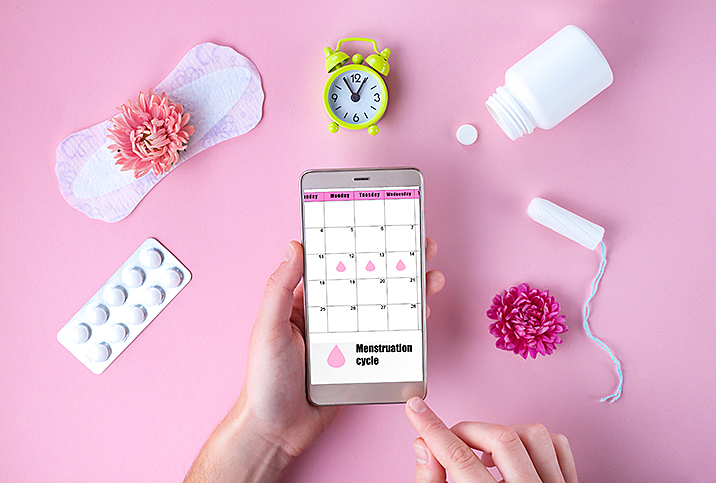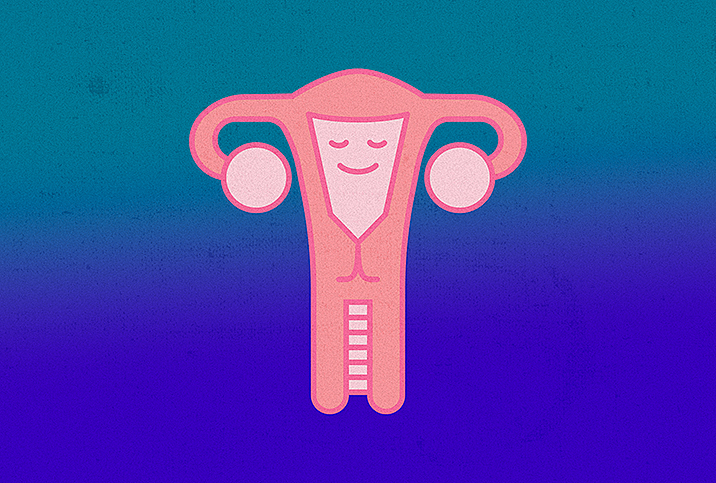How Paid Menstrual Leave Can Reduce Workplace Stigma

You're staring at a computer screen Monday morning, and you start to feel constriction in your lower abdomen and uterus. You know it won't be long until cramps radiate through your entire stomach and legs, causing you to double over at your desk. Usually, you'd suffer through the workday praying to the Midol gods, or you'd use one of your too few vacation days and head home.
All too often, this is the case for menstruating people in the workplace. According to the American College of Obstetricians and Gynecologists (ACOG), more than half of menstruators suffer from dysmenorrhea, the most common type of pain during periods. A 2019 study published in the British Medical Journal indicated 80.7 percent of participants reported decreased productivity during their period.
What if there were a menstrual leave policy at work where you didn't have to hide your period's occurrence as a reason for calling out or suffering through the day?
Paid menstrual leave policies are slowly emerging into the public ether through companies in countries including Japan, Taiwan, South Korea and Indonesia. Recently, DivaCup, a period brand based in Canada, introduced a menstrual leave policy with 12 paid days off per year. A press release stated DivaCup instituted the policy as part of its overarching mission to destigmatize periods.
Why not just use sick days for period pain? The federal government doesn't require employers to provide paid sick leave.
The stigma of periods occurs everywhere, including in advertising language that tries to conceal the experience or that markets how "fresh" or "clean" products might make someone feel on their period. Silence contributes to stigma, which conditions those who bleed to hide the experience.
From schools to workplaces, this stigma behind periods influences how we talk about them to how we hide them. In the aforementioned study, 67.7 percent of participants wished they had more flexibility in both hours and tasks while on their periods, and 13.8 percent reported being absent during their periods. And when someone called out due to their period, only 20.1 percent reported why to their employer.
Why not just use sick days for period pain? The federal government doesn't require employers to provide paid sick leave. According to the U.S. Bureau of Labor Statistics, on average, employees in the private sector receive 7 days of sick leave per year if they have 10 years or less of service. By the time an employee reaches 20 years of service, the average number of sick days only increases by one—to 8 days per year. Additionally, the Bureau's 2019 National Compensation Survey found paid sick leave becomes scarcer the less money you make.
For companies with less understanding of menstruation than a period brand, for example, how do you enact a policy that serves employees and doesn't potentially increase the stigma?
Lara Owen, Ph.D., introduced a menstrual leave policy at the British company Coexist and said menstrual leave could foster a workplace culture of respect and trust.
Owen believes companies that implement menstrual leave policies might see "higher levels of staff retention, satisfaction, and loyalty." And "increased well-being among not only menstruators but also other staff who will benefit from a kinder workplace that respects the realities of the body."
How do you enact a menstrual leave policy?
For Owen, who detailed her work on Coexist's menstrual leave policy in a 2018 article for the Journal of the Association for Management Education & Development, enacting such a policy began as process-oriented and remained flexible to feedback from staff.
Owen found that for employees, paying back time was often too complicated. One day a month for menstrual leave sufficed, and more time off would come out of sick pay. Owen also found that whether people use the time depends on how extroverted their job is. The company uses an app that people with periods can use to share info and take time off. People in front-facing roles were more likely than people in back-end roles to use the app.
Male coworkers expressed no resentment to the policy and instead found more permission to cater a workday to the needs of their bodies.
What to include when drafting menstrual leave policies
Owen advises companies drafting new menstrual leave policies "to ask staff what they need and to listen" and to "train management in how to talk to staff about their menstrual needs, and understand what these might be."
Moving forward with new menstrual leave policies, employers need to consider past stigma. Owen recommends employers factor in the longstanding conditioning to hide menstruation and not speak of it. "Often, staff need encouragement and reassurance that openness about their menstrual needs will not be used against them," she explained.
Another crucial factor when drafting menstrual leave policies is inclusivity. An activist named Méfi started a petition for genderless menstrual leave, calling for 12 days off per year for people who suffer from chronic pain due to their period. Additionally, Méfi hopes to break the stigma around menstruation and the idea it only happens to women.
Méfi advises companies to ensure anyone who bleeds is factored into the policy, including trans and nonbinary individuals. Trans people might feel heightened dysphoria or endure more gender discrimination around their periods, so it's imperative policies are written to be inclusive.
Slashing menstrual stigma in the workplace and beyond
To track whether paid menstrual leave lessens stigma over time, there needs to be more research in the workplaces that implement these policies to show people who use them won't face increased discrimination around promotions. "The fact that we see more public discourse around paid menstrual leave in developed countries is a promising sign," Owen said.
Méfi noted having regulations can help lessen stigma because it offers protection for calling out of work. "Bleeders are actually more likely to be discriminated against if they are taking days off according to their cycle (almost monthly)." This is "due to the fact that there is currently no related leave, therefore, no regulation that could protect them."
Méfi further explained that "creating a paid menstrual leave will open the discussion about periods, which will demystify and therefore reduce the stigma."
Owen noted the pandemic has helped change incorrect attitudes about working from home (e.g., people can't be trusted to work productively). She attributes the rise of interest in menstrual leave provision, in part, to these shifting attitudes.
"This makes it possible to change the concept of menstrual leave in many lines of work so that it becomes menstrual flexibility rather than menstrual leave," Owen said.
The stigma of periods occurs everywhere, including in advertising language that markets how 'fresh' or 'clean' products might make someone feel on their period.
Working from home doesn't help front-line workers, but Owen offered a solution: "My research showed that the best thing for front-facing workers is to focus on teamwork using menstrual cycle apps to share their cycles," she said. This way, "they can plan ahead to support each other by creating rotas and schedules with the menstrual cycle in mind, and allow for days off, or shorter days, for those who have menstrual symptoms and/or feel their well-being and health benefit from respecting their period as a time to slow down."
Méfi added that "implementing [paid menstrual leave] will finally allow normalizing periods as something that no one should be ashamed of or find repulsive."
The stigma of menstruation has been used to further marginalize those who endure it. Menstrual leave policies might help promote self-care and menstrual and physical health. Policies could also help with the stigma by addressing bleeding and ending silence in the workplace and beyond. For menstrual leave policies to help, attitudes about menstruation must change.
As Owen stated, "There is a long history of expecting menstruators to grin and bear it, in general, and especially in the workplace."


















